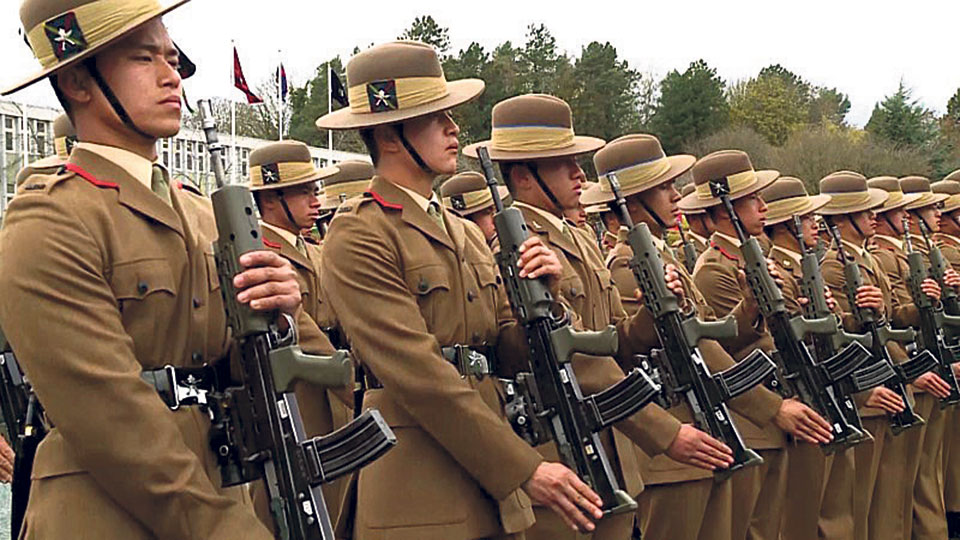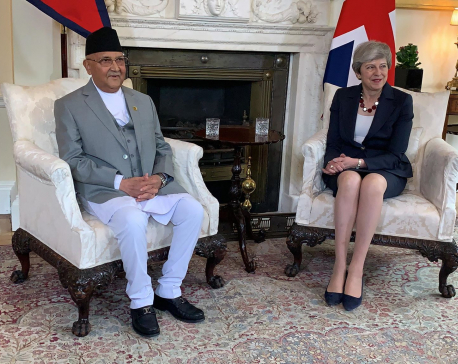
OR
Ex-Gurkhas give UK govt until July 1 to ensure pension parity
Published On: March 20, 2019 06:30 AM NPT By: Republica | @RepublicaNepal

KATHMANDU, March 20: The agitating Gurkhas Joint Satyagraha Struggle Committee (GJSSC) has threatened to launch stringent protests from July 1 if their demand to form a talks team comprising the representatives of Nepal government, UK government and agitating ex-Gurkha servicemen to settle the issues of compensation and pension parity with their British counterparts.
While expressing disappointment that the British government had recently announced a 'meager' hike in their pension instead of ensuring parity with their British counterparts, the GJSSC has announced to launch various protests including mass demonstrations both in Nepal and the UK, obstruct the work of Gurkha recruitment centers and stage decisive a hunger strike against the 'discriminatory policy' of the British government. The GJSSC submitted a memorandum to this effect to Nepal government on Tuesday, while it plans to submit its memorandum to the British government on Wednesday.
Organizing a press conference in the capital on Tuesday, GJSSC Chief Coordinator Krishna Bahadur Rai said the British government had put the British Gurkha servicemen, who retired before 1997, into a great injustice by denying them equal salary, pension and other perks and benefits as compared to their British counterparts. “We had expectation that a talk team would be formed with the representation of the agitating Gurkhas on the basis of the report submitted by a Joint Technical team to resolve the issues of compensation and pension parity once and for all. We are disappointed that no such decision was taken even after the visit of British Minister of State for the Armed Forces Mark Lancaster to Nepal,” said Rai.
GJSSC officials said the decision of the British government to hike their pension by 10 to 34 percent depending on their ranks in the British Army was 'nothing but a conspiracy' against their fight for equality and justice and the continuation of their old 'divide and rule policy'. “This is a sheer mockery of universally established principles of human rights, UN charter and Britain's own Race Relations Act 1976. The decision to bring nominal increment in pension in 'one-sided and whimsical manner' is unfortunate and ill-intentioned. We strongly denounce and regret such decision. Are we beggars?” Rai vented ire, while expressing their resolve to continue their fights for justice and equality.
The agitating Gurkhas maintain that the British government had discriminated against them in their year of service and pension despite the fact that the Tripartite Agreement reached in 1947 clearly mentioned that they will be treated on same footing as their parent army. Earlier this month, the UK Minister Lancaster announced that the UK government would invest an extra Rs 2.5 billion a year to increase individual pensions of some 13,000 pensioners.
Earlier, the GJSSC had issued March 18 deadline to form a high-level government team with their representative to hold negotiations between the two governments to settle the issues of compensation and pension parity. The fresh deadline was served after British government tried to appease them through a hike in pension instead of ensuring parity in pension and providing them compensation for decades of discrimination.
You May Like This

UK won't review tripartite agreement on British Gurkhas
KATHMANDU, June 17: Prime Minister KP Oli has indicated that the British government was not positive regarding Nepal's proposal to review... Read More...

US and UK join hands to combat human trafficking in Nepal
KATHMANDU, June 14: Amid concerns from various quarters that there was duplication in the work of donor agencies, the USA and... Read More...

Complete education, full health could double Nepal's GDP per capita: WB
KATHMANDU, June 7: Nepal has the potential to double its Gross Domestic Product (GDP) per capita in the long run if... Read More...




Just In
- MoHP cautions docs working in govt hospitals not to work in private ones
- Over 400,000 tourists visited Mustang by road last year
- 19 hydropower projects to be showcased at investment summit
- Global oil and gold prices surge as Israel retaliates against Iran
- Sajha Yatayat cancels CEO appointment process for lack of candidates
- Govt padlocks Nepal Scouts’ property illegally occupied by NC lawmaker Deepak Khadka
- FWEAN meets with President Paudel to solicit support for women entrepreneurship
- Koshi provincial assembly passes resolution motion calling for special session by majority votes







_20220508065243.jpg)





Leave A Comment